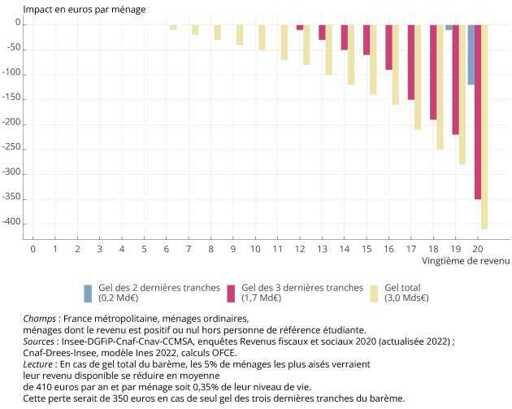- 655 Posts
- 117 Comments

 2·26 days ago
2·26 days agoLet me give you an overly simplified example. You are in a property market where rental yield is 3% (happens in some cities)
You could put a million dollar into buying a house and save $30k in rent every year
or
You could rent a million dollar house for $30k, and invest your million dollar in the market at 7%, returning $70k per year
Obviously this gets more complicated with mortgages, taxes, maintenance, interest rates, etc. but the gist of it is that owning your home always comes with an opportunity cost, every dollar of house equity is a dollar that isn’t invested somewhere else. Depending on circumstances, renting might be the most economical choice.
 21·26 days ago
21·26 days agoLe phénomène est puissant chez les sympathisants de La France insoumise (LFI), dont 20 % jugent souhaitable le départ des Juifs – contre 15 % chez ceux du Rassemblement national.
Plus troublant encore : un quart d’entre eux confessent leur « sympathie » pour le Hamas, et 40 % refusent de qualifier l’organisation de « terroriste ».

 41·27 days ago
41·27 days agoWhat you forget is the cost of opportunity: the money that is stuck in a house is money that would yield income if it was invested somewhere else. Long term stock markets typically return 7%+, while rental return (or the rent you save by buying) can be anywhere from 3 to 7% depending on market, minus maintenance and other holding costs.
So there’s no fast and hard guarantee that owning or renting is best - you need to run a proper simulation with the right parametres taking everything into account. In markets with low rental returns, renting is typically optimal.

 102·27 days ago
102·27 days agoMaintenance cost and property taxes too though.
What happened to the French speaking African countries?
 2·1 month ago
2·1 month agoIt’s coming from the Ukrainian war cutting off gas supplies and the French nuclear park having some higher than usual downtimes due to maintenance issues.
 1·1 month ago
1·1 month agoEt oui le temps passe ! C’est l’heure de ressortir le calendrier de l’avant, Mariah Carey, les guirlandes et les boules et le préavis de grève de la SNCF.
 11·1 month ago
11·1 month agoif “someone is wrong on this Internet” is more important to you
If you think misinformation and propaganda is “someone being wrong on the internet” you are clearly a lost cause. Hope you enjoy the troll farms!
$5k per person is 30% cheaper than $10k”
Never wrote such a thing. Good strawman.
 12·1 month ago
12·1 month agobut when you were shown to be wrong about your 30%
You showed nothing. Both the US and Europe mostly rely on making the employer pay, though in Europe it’s typically mandatory and sent to a national system rather than the employer deciding by itself (or not) to pay for a private insurer for varying level of coverage. So there’s just no way the US employers pay 300% more for a system which is “only” 50% more costly.
(also co-pays are fairly standard everywhere in Europe, to avoid abuses)
So that’s my best guess at your motivation, but please correct me. Why?
My motivation is fighting misinformation. Just because the misinformation comes from the side you support doesn’t mean you should ignore it. In this case someone just made up shock numbers to get engagement and clicks, and that’s not how you support a sound health care policy.
 44·1 month ago
44·1 month agoUS GDP is much higher than most (all?) European nations.
And as you accurately pointed out, US population is also higher, and have different costs of living. Which is why we compare countries in % of GDP and not in raw dollars spent nationwide, which would make no sense at all.
The US also has a massive population, which means a much larger insurance pool, which means the risk is spread out over a much larger swathe of people (and ethnicities, lifestyles, etc.).
Doesn’t make any difference when you go over a few million people (or possibly much less)
So I’m not going to say this pic is accurate, as I have no actual numbers on this
Well I do, and this pic is clearly bullshit.
Just because you like the message doesn’t mean you aren’t allowed to point out obvious lies.
 22·1 month ago
22·1 month agoThe point is that the USA relies primarily on employers paying for the insurance (through a pay cut) whereas in the EU it is generally subsidised with taxes.
This is a huge misconception. In the EU it’s also funded by the employers, the difference is that it’s usually mandatory (a tax taken out of the paycheck at the employer level) and also typically goes into a governement-run insurance system (ie the British NHS or the French sécu).
Ultimately it’s always people who pay for health care, because companies are just legal entities. The difference is how it’s organized and how much it cost.
 42·1 month ago
42·1 month agoIt’s a meme, it’s not meant to be accurate
That’s what every boomer on FB propagating fake news about immigrants eating pets also say. Just because it’s a picture means outright lying is okay. (and if it was lying in the other political direction, you’d likely be the first calling bullshit)
Why you our here shilling for big business pal?
Ah yes because everyone who isn’t into lying is “shilling for big business”? Life must be simple in your head. Maybe some people think the truth matters more then coddling their feeling?
 1210·1 month ago
1210·1 month agoAs usual with those sorts of memes, the numbers are completely wrong. European nations spend around 11-12% of GDP on healthcare vs about 17% for the US. So you’d likely pay significantly less (about 30% less) with a similar public healthcare system, but far more than this pic pretends.
Remember kids, don’t believe everything you see on the internet.
 1·2 months ago
1·2 months agoC’est toi qui parle de bénévolat ?
Ce qui se passe ici c’est que l’assurance chômage (et derrière les salariés dans leurs ensembles) subventionne les employeurs du secteur culturel à hauteur de 320 millions par an. Je suis désolé mais c’est pas aux cotisations chômage des salariés de subventionner TF1 ou l’opéra de Paris. S’il y a du travail à faire chez soit, qu’il soit décompté et payé normalement.
Remettrais-tu en cause les compétences de l’administration fiscale française ?
C’est pas le fisc qui contrôle le chômage.
 1·2 months ago
1·2 months agoS’il est indemnisé par la collectivité il n’est pas vraiment bénévole. C’est juste une (énorme) subvention déguisée.
En prime y’a aucun suivi donc n’importe qui peut prétendre faire 80h par semaine de travail “à la maison”. Pareil pour les profs, ils passent pas tous leurs vacances à préparer les cours et corriger les copies.
 1·2 months ago
1·2 months agoSauf que ce “travail à la maison” (9 mois par an !) c’est peut être pas à la collectivité de le financer mais à ceux qui font les spectacles et embauchent ces intermittents.

 5·2 months ago
5·2 months agoLooks about right. Those that I have seen on this list were mediocre at best, and a far cry from the quality of the previous movie(s) which would have been fine being left alone.
 1·2 months ago
1·2 months agoAu rythme où augmente l’endettement français, c’est une question de temps
 1·2 months ago
1·2 months agoFaudrait demander aux retraités grecs ce qu’ils pensent de la résilience du système par répartition, je pense qu’ils seraient dubitatifs…
On épargne pour une retraite pendant 40 ans, même ceux qui sont passés par la crise de 1929 ont plus que retrouvés leurs billes sur une telle durée. Un marché boursier qui serait baissier pendant 40 ans, ça voudrait dire qu’on s’est probablement tapé une guerre thermonucléaire, auquel cas la répartition sera probablement pas meilleure non plus…







Ben non justement, il s’effondre pas pour le top 1% (voir page 6). Pour voir un début de régressivité fiscale faut débuter aux 0,1% voire 0,01%. Et encore, uniquement si on regarde le “revenu économique” qui mélange entreprise et revenus personnels, et qu’on considère que cotiser pour sa retraite est un “impôt” et pas une forme d’épargne forcée (puisque ça sera récupéré plus tard sous forme de rente)
Ce que l’auteur dit c’est que la “cible” du top 1% est mauvaise, c’est essentiellement le même groupe socio-économique que le top 10%. Comme il le dit, y’a plus d’écart entre Arnault et Bolloré qu’entre le top 1% et le top 10%.